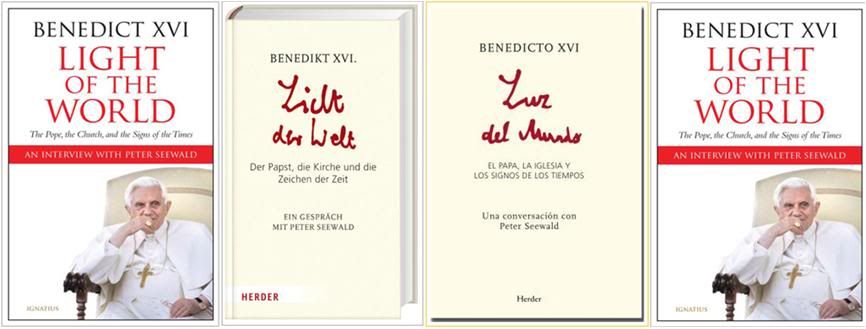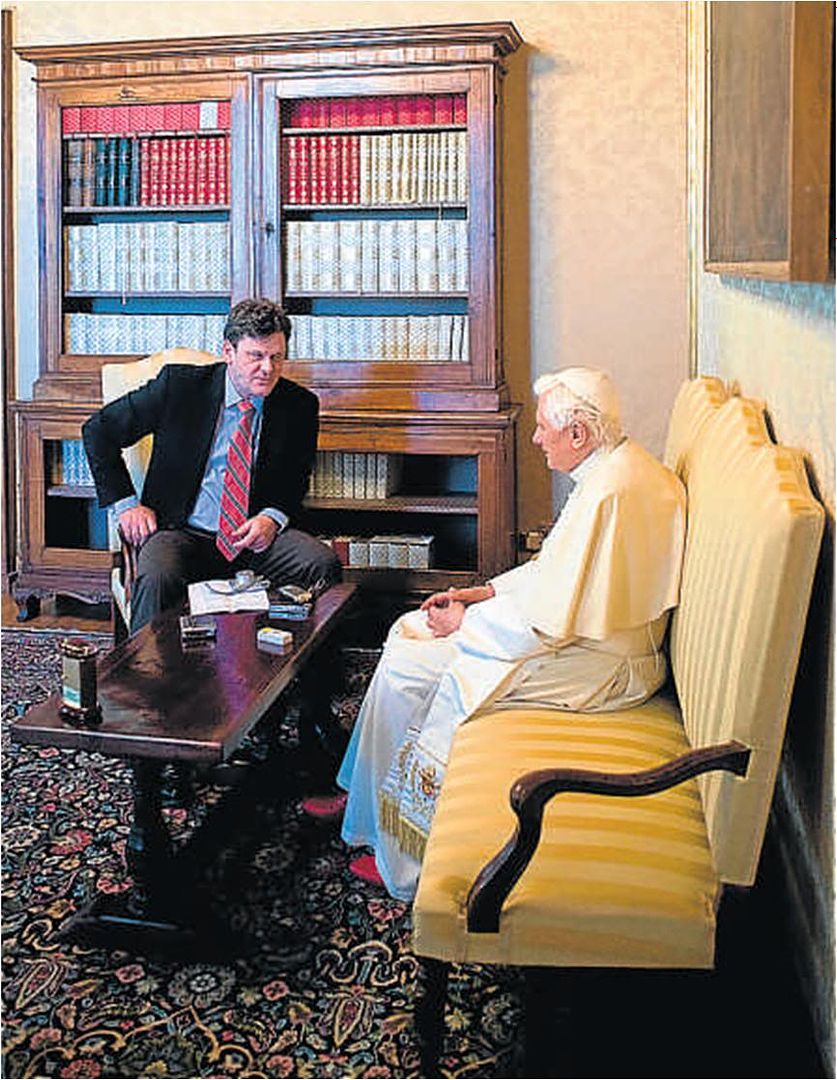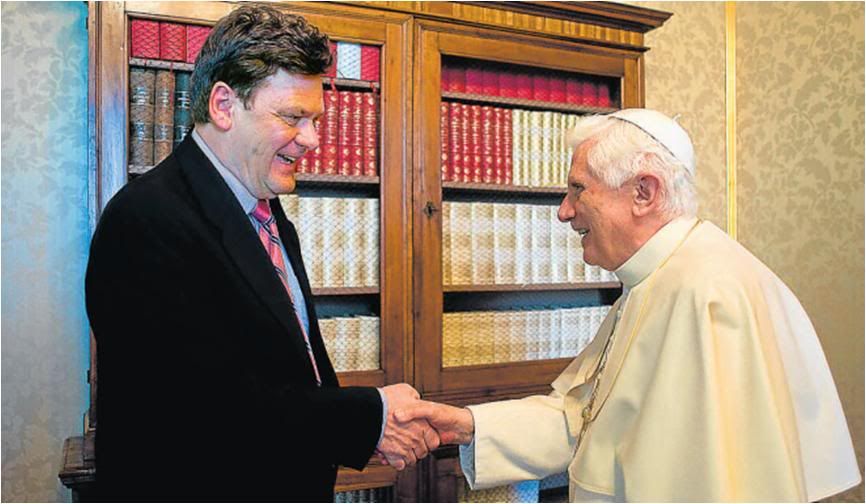 With only two weeks to go until the simultaneous release of Benedict XVI's first interview book as Pope in a dozen languages, Herder publishers facilitated an interview with Peter Seewald for the Sunday La Vanguardia of Barcelona which came out on the day the Pope dedicated the Basilica of Sagrada Familia. Here is a translation....
'With the Pope, you can laugh out loud -
With only two weeks to go until the simultaneous release of Benedict XVI's first interview book as Pope in a dozen languages, Herder publishers facilitated an interview with Peter Seewald for the Sunday La Vanguardia of Barcelona which came out on the day the Pope dedicated the Basilica of Sagrada Familia. Here is a translation....
'With the Pope, you can laugh out loud -
he has a great sense of humor!'
Interview with Peter Seewald
by RAFAEL POCH
Translated from

Nov. 7, 2010
Bavarian journalist Peter Seewald is considered to be Joseph Ratzinger's principal biographer. Seewald, who lives in Munich, was born in 1954 to a Catholic family in Passau. As a teenager, he was influenced by the 1968 leftist movement in Germany, which led him to leave the Catholic Church at age 19.
He started as a journalist by writing for a leftist weekly in Passau, and later began working for established periodicals like the weekly magazines Der Spiegel and Stern and the newspaper Sueddeutsche Zeitung. In 1983, he started to concentrate his writing as a journalist and book author on religion.
In 1996, he published his first book with then Cardinal Joseph Ratzinger,
Salt of the Earth, which was based on several days of interviews with the cardinal. The experience led him to return to his Catholic faith. A second interview book with the cardinal,
God and the world, was published in 2000. Both books have since been translated into 25 languages.

Last summer, Seewald was given another series of interviews over a week with the now Pope, at the papal residence in Castel Gandolfo, resulting in the third interview book,
Light of the world, which is coming out this month in 12 language editions.
It is the first time that Papa Ratzinger answers specific questions about his Pontificate, including his own assessments of it and about the 'sex abuse scandal' in the Church.
You have had long conversations with Joseph Ratzinger for these three interview books. Could you describe him as a person?
It is not easy to sketch his portrait. Some do not know him at all because they just do not like him, while many have an idea of him that is based on media accounts that often have meager information. But the fact is that when people have an opportunity to observe him in person, as what happened recently in the United Kingdom, they get a completely different image from the prefabricated one found in often hostile media reports.
For almost 20 years now, I have dedicated myself exhaustively to his biography and to following his life, what he says and what he does, and I can say that he is truly an extraordinary person with extraordinary charisma.
As a professor, he explained the Gospel with such freshness that some of his students say it was almost as if Jesus himself was in the lecture hall.
As prefect for the doctrine of the faith, he conveyed the authoritativeness of having a knowledge of modernity in a very detailed manner and of confronting it with the truth of Christianity.
He likes to say that faith should and can be explained because it is reasonable...
He has a brilliant mind, and is certainly the greatest thinker in our day. But his high intellect is united to a profound piety. He can scale the highest intellectual peaks while keeping his feet firmly on the ground, thanks to his upbringing in Bavarian Catholicism.
He is not among those who do not practice what they preach
[the idiom used translates literally as 'who preaches water but drinks wine'] but someone who is holy and humble, and who is authentic because he says what he thinks and does what he says.
Those who know him see him as a very amiable person, very wise but humble, and very open and modern, someone who keeps himself youthful even at his age. Sometimes, he can be too reserved and overly cautious. And he is not the kind to engage in back-slapping familiarity, but he is extraordinarily loyal and still retains and maintains his friendships from his student years.
What I most admire in him is his simplicity combined with courage. He will tolerate discomfort without allowing himself to be bothered. by it. He is almost always right in his analyses and judgments. He also has a great sense of humor - with him you can laugh your guts out!
A change of responsibilities can determine a lot. Was the cardinal very different from the Pope now? Have you noted any changes?
He did not want to be a bishop but he had to accept it. He did not want to be in the Roman Curia but he had to accept it. He did not want to be Pope, but he had to take on the office in which it was clear he would have to suffer very much.
Just think of the enormous efforts that being Pope demands. Think of the weight of all the abuses committed in the Church that have been uncovered. He has wept with some victims and is shamed by the filth that there is in the Church.
And yet he carries these burdens with impressive self-possession and calm, because he knows - as he often says - that he cannot do everything nor should he.
[You do all you can and then you trust in God for the rest, he often tells his priests.]
After a giant figure like Karol Wojtyla, nobody thought there could be a succession without ruptures. But Ratzinger achieved that. He governs the Church with a style characterized by collegiality, dialog and humility.
Above all, he teaches, tirelessly and patiently, how to rediscover the faith - not as a system of theories, but as an invitation to undertake a personal relationship with God.
In short, he does not act like a prince of the Church before whom one must tremble, but a servant of the Church, a great steward who devotes himself completely to his mission.
Has he changed? Of course, his present function gives him a special aura, but in his essence, in his conduct, in what he does and what he considers right, Joseph Ratzinger has not changed, but one might say he has been perfecting himself.
I believe that his task as the Successor of Peter has brought his personality, his talents and his charism to maximum fulfillment.
What are the things that cause him most suffering and concern?
I think it is the evaporation of faith in large parts of the Western world and the increasing alienation from God that results from it.
The crisis in the Church is another. The lack of commitment, and above all, the cases of sexual abuse that have cast a cloud over his pontificate. On the other hand, the crisis in society. And of course, both crises are related.
At various times in the past, there have been attempts to declare that God is dead, especially when there are new and tangible golden calves. The Bible is full of such stories. These have less to do with a lack of attraction in the faith than with the power of temptation.
But where can an atheist society that is alienated from God take us? Where can Europe go if she breaks off from her roots? And have not both East and West already gone through such experiments with terrible consequences for the peoples that are torn apart, the chimneys in the concentration camps, and the killing fields of the Soviet gulags?
This Pope has taken on, as no one has before him, all the failures, mistakes and sins of the Church, but he also calls attention to the aberrations of society and the dangers of continuing with such aberrations.
Atheism is not necessarily inoffensive. Even as a cardinal, Joseph Ratzinger warned against the resulting loss of identity, of orientation and of truth, if ever the new paganism takes control of the thoughts and actions of people. Now, we can observe that those warnings were not unfounded.
Does Ratzinger have a fear of God?
Doesn't every believer? But as he has revealed himself to us in Christ, God is a loving being, who pardons, who reconciles, and gives freedom, who knows the needs of every creature, and who emptied himself out of love to the point of dying on the Cross.
God made himself 'small', to the measure of man, so we can understand him, but nonetheless, he remains incomprehensible in his mystery and infinite grandeur, as well as in his power, which can get to be frightening.
Once I asked Joseph Ratzinger if he sometimes did not feel fear of God. And he answered, "I would not call it fear since we know that Christ is God and that he loves us". But he points out that since God accepts man with all his weaknesses, "as a priest, I always try to maintain that ardent feeling that God has an idea of who I am, what I can do, what I can give"... Well, now we know, at least, what idea God had of him...
How does he see mankind in this new century?
One cannot miss the fact that at the start of the third millennium, mankind finds itself in an upheaval of enormous proportions, with all the complex problems of the environment, of the crisis in the financial economy, of the collapse of society.
Christians have been reproached that their religion is an illusory world, but now we are seeing all the truly illusory worlds: the mirage of the financial markets, of the communications media, of fashion and of flashy lifestyles.
We see an unchecked banking system that can wipe out entire national patrimonies. The obsession of 'optimization' at any cost, the total absence of scruples, human 'brutalization' through the advertising and entertainment industries - these are the things that literally make our society sick.
We should ask ourselves when is progress truly progress? Should we continue doing all that we can possibly do just because we can do it? And if we look to the future, how will future generations deal with the problems which we are passing on to them? Will they have a strong and solid base to overcome the chaotic times that await them?
In the new book, Benedict XVI expresses his active concern for all this. His message is a dramatic call to the Church and to the world, to everyone! "We cannot go on this way!"
Mankind finds itself at a crossroads, we took a wrong turn, it's time to reflect. The time has come for fundamental change, for repentance, and he continues, "There are so many problems that must be solved, but they cannot be resolved until and unless God is placed back at the center and made visible in the world..."
Christianity Is not out of time, he says - on the contrary, it can be discovered anew. The revelation of Jesus gives strength and hope. It is the basis for formulating a vision of the future for a society that wants salvation from the verge of self-destruction, by reflecting on firm and reliable values.
How does he himself see the mission of his Pontificate?
He himself said that he began his ministry with the idea "to make clear that the Word of God must be maintained it all its grandeur and purity, in such a way that it cannot be broken by constant changes in tastes".
His principal commitment is to the renewal of the Church. "The Church and her members need constant cleaning", he wrote in his book on Jesus. "Those who have made themselves too big must return to the simplicity and the poverty of the Lord".
What he wants is that after the terrible abuses and aberrations that have occurred, the Church should subject herself to a kind of deep cleansing. After so many sterile debates and so much self-absorption by individuals, it is essential to return to the mystery of the Gospels, to get to know Jesus Christ in his complete and cosmic grandeur. But purification is a difficult process that has its enemies within the church.
For today's lifestyles, positions such as those that the Church defends have been turned into a great provocation. We have become accustomed to considering traditional attitudes and behavior as something that must be broken with, in favor of cheap and current tendencies.
"Pray for me so that I may not flee from the wolves", he asked when he began his Petrine ministry. At the same time, he trusts that the era of relativism, in which nothing beyond one's own self is recognized as valid, is coming to an end.
In fact, there is a significant growth in the numbers of those who are coming to value the Church not just for its liturgy but also for its resistance. There appears to be a clear change of consciousness from mere compliance with appearances to taking Catholic practices seriously and living one's religion with authenticity.
But in the mission of this Pontificate, there are many great goals, as for instance in the ecumenical field, in inter-religious dialog, but above all, int he re-evangelization of the West.
Nevertheless, for this Pope, the essential is to show God anew to men, to tell them the truth, the truth about the mysteries of creation, the truth about human existence, and the truth about Christian hope that goes far beyond the merely earthly.
What do you think are the most difficult moments Joseph Ratzinger has experienced in his personal life?
There have been many, without a doubt. He comes from a family that was anti-Nazi and had a difficult life during the Nazi years. We have his memories of the war that he lived as a youth conscript from age 14, his time as a prisoner of war, and the difficult early postwar years. As a child, he almost drowned in a pond, and later he survived a potentially lethal infection during the war.
A great shock for him was the possibility that his Habilitation dissertation
[to qualify him to be a university professor] would not pass because his thesis adviser thought his ideas were too 'modern'. Fear of failure was all the more serious because he had already brought his parents to live with him in the expectation of being able to take care of them [with his salary as a professor]...
Then there were the deaths of his parents, and much later, of his beloved sister Maria.
And just when he had settled into the academic world of Regensburg and thought he could look forward to the theologian-scholar's life that he desired, almost like a blow, there came the nomination to be Archbishop of Munich by Paul VI.
And it could not have been easy to spend almost 25 years at the CDF being 'bad cop', being the scapegoat for everyone who had a grievance against the Church, and being considered a Panzerkardinal which he never was...
But after all that, the most difficult moment for him would have to be when they were counting the votes at the Conclave. He was looking forward to retirement. he certainly did not want to be Pope. As he himself said, he thought of his election like a guillotine poised over his head.
Do you think that being German has introduced some significant personal nuances into his Pontificate?
As a Bavarian, he is not necessarily a typical German, but he has brought to his office some characteristics attributed to Germans, such as precision, reliability, perseverance and diligence.
Of course, there is also a historical slant. For almost a thousand years, the Germans were a pillar of the Holy Roman Empire. And the profound exploration of human knowledge, such as that embodied by Meister Eckhart, Goethe, Kant, Hegel, is one of the fundamental characteristics of the German people.
But Germany was also the land of religious schisms, the cradle of scientific Communism, and not the least, the setting for a diabolical regime that decreed the extermination of the Jews.
Ratzinger became the first German to be Pope in 500 years. If we consider that two great schisms within the Church each took place under a German Pope, it is all the more remarkable that there is such a clear desire for Christian unity in Benedict XVI's Pontificate.
In almost a thousand years, there had been no great progress in relationships between the Roman and Orthodox churches, until now. At the same time, relations between the Vatican and Israel are better than ever, as President Shimon Peres said recently.
The Pope views the circumstance that he is German more as a point of reflection. God willed that a German professor would become Pope at this time, to bring to the fore the unity between reason and faith.
It seems to me a magnificent thing that in an age when no value is recognized as supreme, which so often prescribes falsehood and even pure lies, at a time when frequently the blind lead the blind, we have a Pope whose voice and integrity are sure indicators of the way to go.

[Modificato da TERESA BENEDETTA 11/11/2010 13:41]